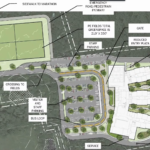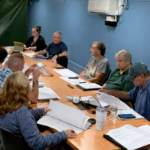The Conservation Commission voted 6-0-1 at its meeting Tuesday to approve the use of two herbicides to control the overgrowth of weeds in Lake Maspenock as part of its “toolbox” strategy for weed management.
This is the first meeting where new Department of Public Works Director Kerry Reed has appeared before the Conservation Commission to discuss mitigation strategies for this growing problem. The potential use of herbicides has divided lake residents and environmental activists as to the best methods to maintain the ecology while controlling the weeds that can choke off some species there.
Reed, a former commission member, began her presentation by explaining that she consulted with the Massachusetts State Ethics Commission to make sure there was no conflict of interest because of her prior involvement. Her family has a membership with the Lake Maspenock Preservation Association (LMPA), and she lives in the neighborhood but not on the lake. She also filed a disclosure of appearance of potential conflict of interest to Town Manager Norman Khumalo and Town Clerk Connor Degan prior to the meeting.
History of weed management efforts discussed
Reed explained that Lake Maspenock, located in the town’s southwestern corner, is mainly located in Hopkinton but also extends into small parts of Upton and Milford. This man-made lake was created in 1834 with a dam installation, and the town purchased it in 2006. The first weed study there was performed in 1979. In 2015, Town Meeting authorized the Select Board to create a citizen advisory group (also known as the Citizen Input Group or CIG) and a five-year comprehensive weed management control plan that was adopted in 2016. The group has performed annual weed surveys.
The Conservation Commission in 2020 denied a notice of intent for the use of herbicides submitted by the DPW in a 4-3 vote. Reed said part of the reason was that “there wasn’t enough of an alternative analysis conducted.
The weed management plan was updated in 2021and a “toolbox” of weed control options was created that “took to heart” the commission’s recommendations. The toolbox includes strategies such as regular and extended drawdowns, benthic barriers, hand harvesting, mechanical harvesting and herbicide treatment.
The DPW must appear before the Conservation Commission every year to describe the tools it intends to use. Reed noted some of the most prevalent species are fanwort and milfoil. There is also a mix of native and non-native weeds.
DPW’s “preferred method” is an extended drawdown, Reed explained. But it only works when the weather is cold enough. The past few winters have been uncharacteristically warm.
Hand harvesting has been done on a local level by the LMPA and volunteers. While successful, it only works well in small areas. Other methods used by DPW have had small or moderate success. Mechanical harvesting has not been tried because of the cost, and herbicides have not been used.
Herbicide recommendation receives vocal feedback
Reed explained that the two herbicides that will be used are Tribune (diquat) and Aquathol-K (endothall). Targeted application is expected to begin in early June to the northern basin north of Sandy Beach up to West Main Street. This is where the weed growth has been most extensive. There will be a public awareness campaign beforehand.
As an extra precautionary measure, the lake will be closed to the public for recreational activities on the days of application, according to consultant Domenic Meringolo, the senior environmental engineer at SOLitutde Lake Management.
CIG leader Joe Baldiga said the group has been assessing the best way to handle this situation for a decade.
“We are pro-lake,” he explained. “None of us are pro-herbicide or pro-chemical. None of the other tools in the toolbox will work for that area.”
He added that the weeds are now migrating from the north basin to the south basin and past Sandy Beach.
While he said he understands that there is a vocal group against the use of herbicides, they “haven’t offered any practical alternative solutions.”
Heath Director Shaun McAuliffe, who previously was an environmental scientist, said that the Environmental Protection Agency tests herbicides for PFAS, “and they are not allowed to be used as an adjunct.”
He added: “This PFAS pesticide issue really shouldn’t have any bearing on the lake.”
Vice chair Melissa Recos, who chaired the meeting, noted that development around the lake “is creating issues [where] you have to take the measures that you have to take with herbicides to get things back in balance.”
Other strategies will be continued with stakeholders, while the herbicides will be “a short-term tool.”
Resident Ken Parker expressed concern that killing weeds in one area would allow nutrients to be available for weeds to grow in another section. Limnologist Dave Mitchell said it would be “very unusual.”
Don Sutherland, the chair of the environmental working group of the Sustainable Green Committee, said the committee is opposed to the use of herbicides. He noted that diquat use has been banned in Europe, and said that MassDEP and the Massachusetts Department of Agricultural Resources confirmed to the SGC that PFAS is permitted in pesticides and aquifer herbicides.
McAuliffe confirmed what he read in the EPA document. He said he could reach out to MDAR for clarification.
Recos added that the commission is operating under its bylaw and the Wetlands Protection Act, not with Europe’s requirements. She said she hopes to work in collaboration with the SGC in future discussions.
Jaime Goncalves, the LMPA president, said herbicide use is only “to retard the weeds’ growth,” not kill them all.
“It’s not going to be a complete desert,” he said. “I think there’s been some misconceptions about that.”
Carol Esler questioned why hydro-raking was not considered. Recos explained that hydro-raking is a type of mechanical harvesting. It has not been used because it is quite expensive and produces limited results. It is also “not applicable for this area of the lake.”
“We have repeatedly shared with [those in opposition] how we have spent an extensive amount of time looking at these alternatives, particularly mechanical harvesting” Baldiga said. “They just don’t want to hear it.”
Chair Jeff Barnes abstained from voting because he recused himself from the discussion.






















0 Comments